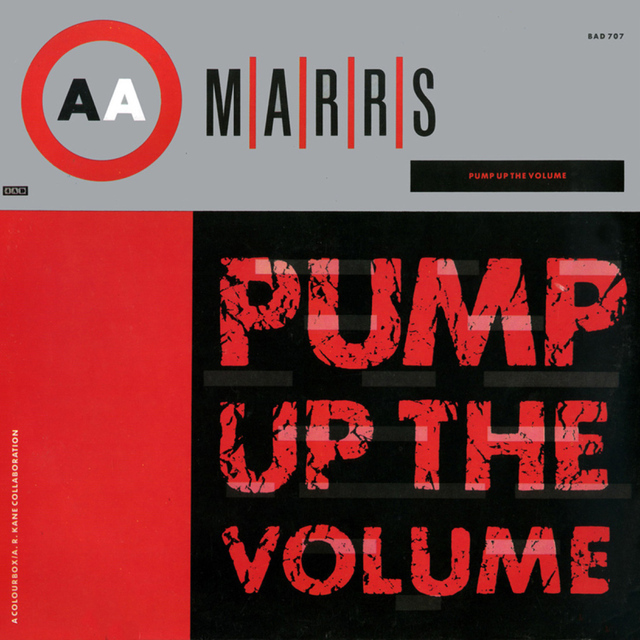Shortly after sample-heavy Hot Doggie by Colourbox appeared on the 4AD Compilation “Lonely Is An Eyesore”, the label released a collaborative single between Colourbox and label-mates AR Kane as a Double A-Side. The result was less of a collaboration than intended. One side was nearly all AR Kane, the other side was nearly all Colourbox. It was the latter side that got the airplay, and that took the song to the top of the UK Charts.
Pump Up The Volume is even more sample-heavy than Hot Doggie, but takes its source material mostly from other songs rather than from film/TV and therein lies the source of so much trouble. Sued by Stock, Aitken and Waterman (SAW) for a relatively minor sample from their song Roadblock, the artists who made this record reportedly ended up without a penny from the hit UK release.
The name M|A|R|R|S came from the members of the collab - Martin Young (Colourbox), Alex Ayuli, Rudy Tambala, Russell Smith (AR Kane), and Steve Young (Colourbox). The only significant radio play was of the mainly-Colourbox side Pump Up The Volume, rather than the mainly AR Kane side Anitina.
The title of Pump Up The Volume comes from a sample taken from I Know You Got Sould by Eric B. & Rakim.
The song is basically a repeating Roland TR-909 beat with a near-constant bass-line and very little other harmonic content. There’s an occasional Aminor piano stab, but the “top line” doesn’t come from the instrumentation - it comes from the samples of other songs.
Which samples you hear depends on which version you listen to. Clearance wasn’t obtained in advance, and different countries ended up with different sample combinations. Even in the UK, there were mixes with samples added/removed. The Wikipedia article has a good diagram of which versions contain which samples.
The main UK release included samples from Roadblock which resulted in the legal issues - even though the original had plagiarised from others. The courts distinguished between sampling and plagiarism, and SAW won, taking all the royalties from the hit single. It’s surely right that some payment had to be made, but 100% seems a tad excessive.
People learned from this - after this record, if you wanted to legally sample, say, Tainted Love by Soft Cell, you would get someone to record a new snippet that sounded exactly like a sample would. But you no longer had to pay performing rights to Soft Cell. You’d still have to pay the publishers (usually the songwriter - who weren’t Soft Cell, it was Ed Cobb). We ended up with a situation where people were copying the sound of that particular cover but the people who created that sound got nothing.
Anyway, what’s more important for the purposes of this blog is that Pump Up The Volume still sounds amazing.
An aside
Check out the original release of Tainted Love by Gloria Jones, from 1964.
